United Nations and the Shaping of a Technocratic Security Regime

Oct 17, 2023
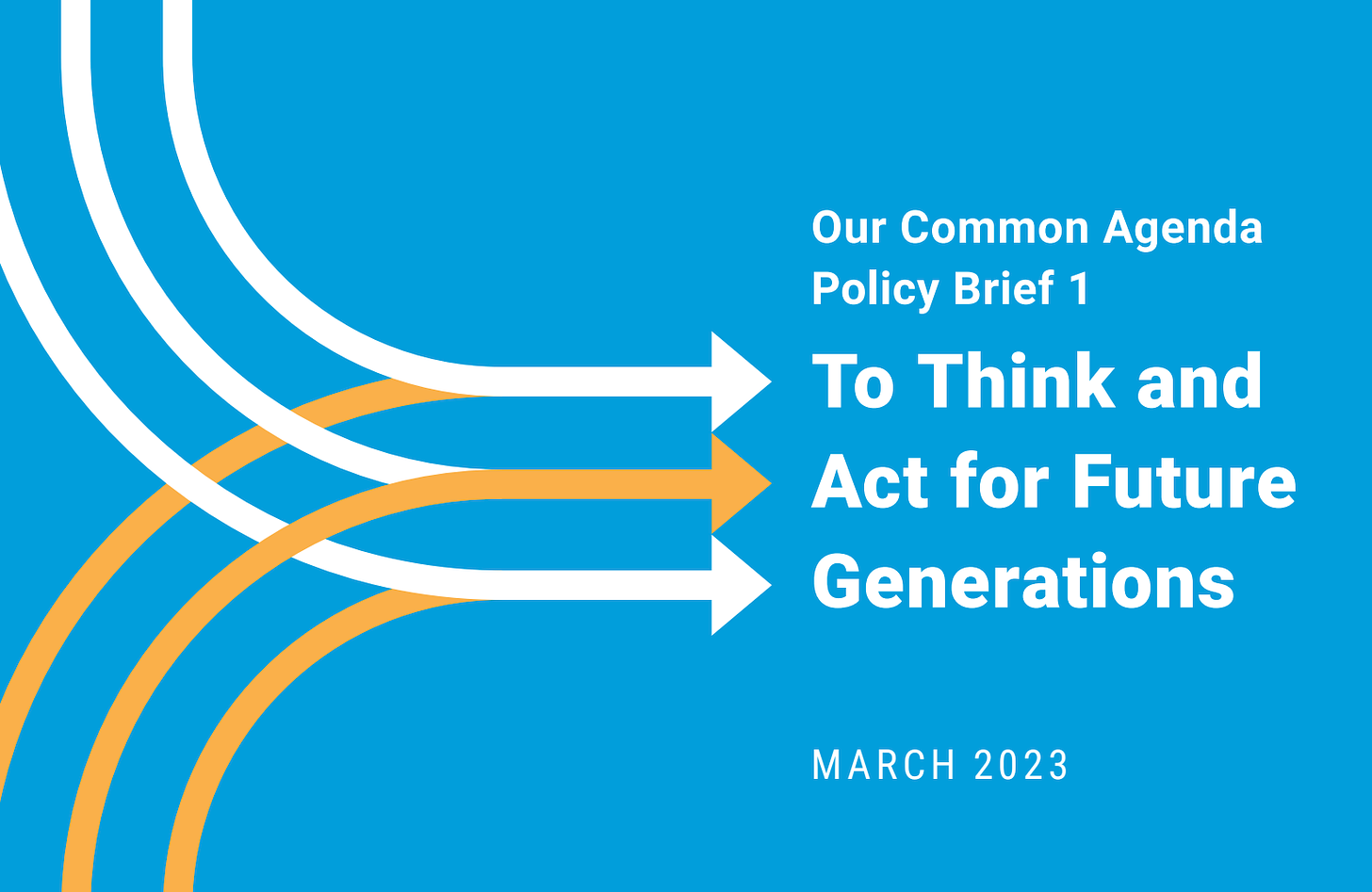
In March 2023 the Policy Brief To Think and Act for Future Generations was released by the United Nations. Securing the interests of future generations is a key component of Our Common Agenda. Everything we do as humans must be weighed against the interest of future generations. UN Secretary-General António Guterres proposes four concrete measures:
- An Envoy for Future Generations
- Better use of foresight, science, and data
- A Declaration for Future Generations
- A Dedicated Forum for Future Generations
Declaration for Future Generations
In 1997, UNESCO released the Declaration on the Responsibilities of the Present Generations Towards Future Generations, which states that “scientific and technological progress should not in any way impair or compromise the preservation of the human and other species” (paragraph 6), and that “the present generations should take care to preserve the cultural diversity of humankind” (paragraph 7).
The Pharos Chronicle – Jacob Nordangård, PhD is a reader-supported publication. To receive new posts and support my work, consider becoming a free or paid subscriber.
Although the Policy Brief refers to the UNESCO declaration, no such obligations are mentioned. Instead everything is aimed at the management of global existential risks. All with a little help from their friends and partners at the World Economic Forum.
This has nothing to do with preservation of the human species and its diverse cultures, it is about redesigning and rebuilding the world. The global crises enable the opening of the technocratic toolbox. As António Guterres (1949-) said at the AI for Good Summit in 2019:
We must seize the moment, in partnership, to deliver on the promise of technological advances and harness them for the common good.
The declaration includes a firm commitment to “securing the interest of future generations in all decision-making, by identifying, managing and monitoring global existential risks, and by focusing polices and programmes on long-term sustainable development”, and to acknowledge that “we are in an era of existential threats, catastrophic risks, unsustainable practices, deepening inequalities, and unprecedented opportunities, all with intergenerational consequences”.
To safeguard the future, better use of foresight, science and data is prescribed. This is expressed in initiatives such as the Data Strategy of the Secretary-General, the Future Labs Network, the new Scientific Advisory Mechanism, Global Risk Reports, and the Strategic Foresight Network of the High Level Committee on Programmes.
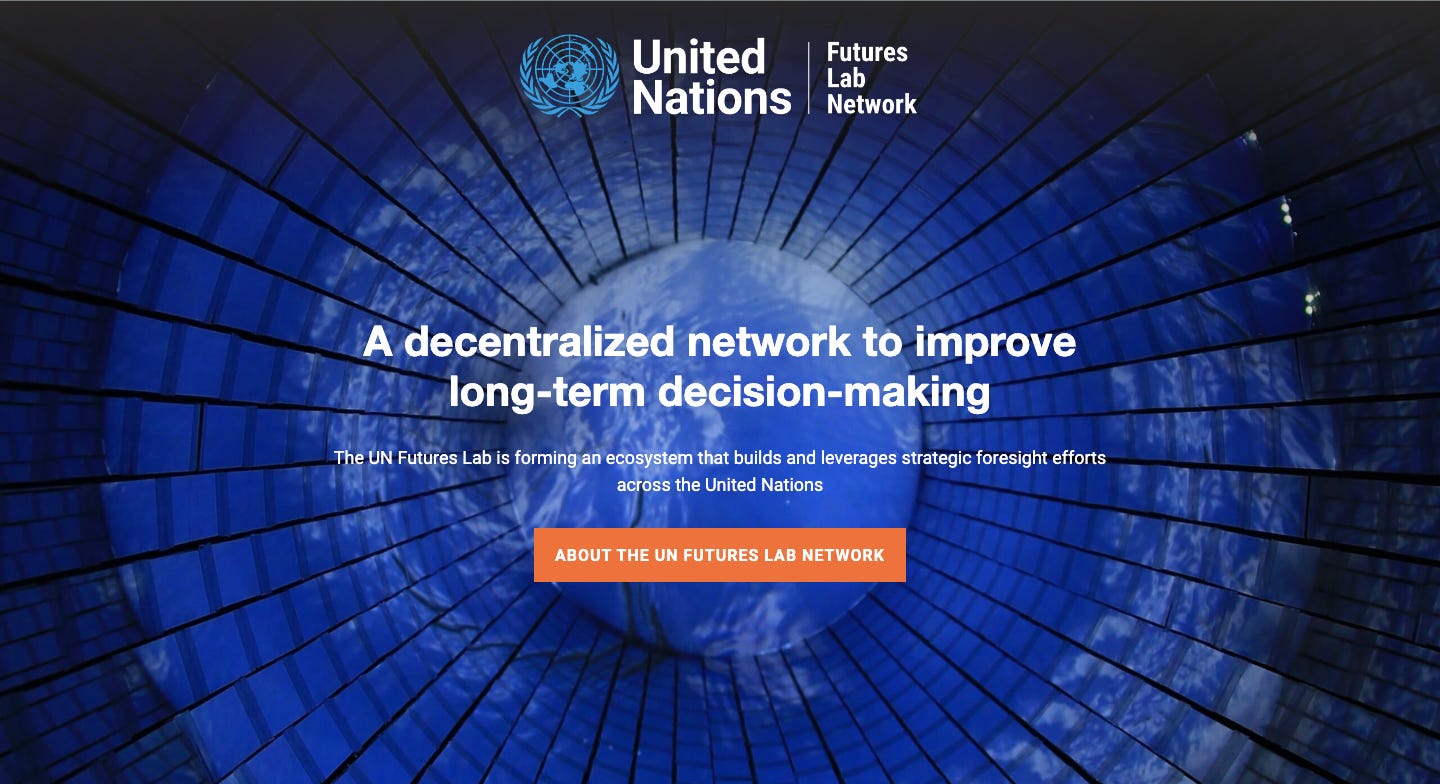
Although it can be argued that caring for the well-being of future generations is a wise and good thing to do, these proposals comes at a price, as they will severely restrict human liberties. The proposals are also based on assumptions that can be questioned, as they are not based in sound science.
They are instead grounded in futuristic ideas about prophesising the future with the help of computer modelling and simulation. Those who decide the planetary boundaries for our actions, build the models and interpret future trends will have the power in the new totalitarian world system. So who will ascend the throne?
Envoy for Future Generations
The Secretary-General Guterres proposes an envoy to “serve as a voice for future generations in the United Nations system” and perform advisory functions such as:
- Advocate and represent the interest of future generations
- Advising on intergenerational impact
- Embed long-term thinking in global, national and subnational policymaking processes
- Facilitate better use of foresight and understanding of future risks, challenges and opportunities by the UN System, and leveraging the Futures Lab Network
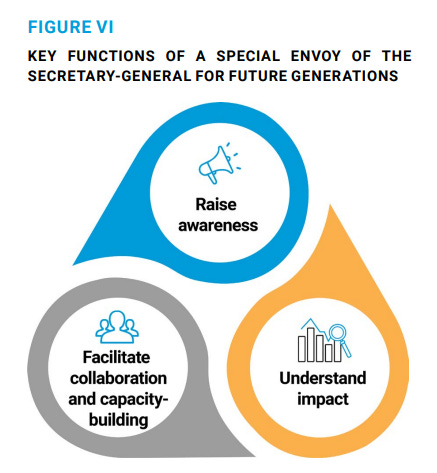
The idea of an ombudsman or representative for future generations was proposed on a national level in The Brundtland Commission’s report Our Common Future (1987):
Others may wish to consider the designation of a national council or public representative or ‘ombudsman’ to represent the interests and rights of present and future generations and act as an environmental watchdog, alerting governments and citizens to any emerging threats.
This idea was later elaborated by German-Swedish journalist and founder of the Right Livelihood Award Jakob von Uexkull’s World Future Council which proposed the concept of a Global Ombudsman for Future Generations at the United Nations conference on the Environment in Rio de Janeiro in 2012.
2 Co-founders of the Council are Club of Rome-members Herbert Girardet (1943-), an urban ecologist, and Michael Otto (1943-), a billionaire and chairman of the mail order company Otto Group, who provided the core funding for WFC.
The think-tank, located i Hamburg, is “committed to a healthy planet with just and peaceful societies now and in the future, and consists of 50 global change makers”.
Future generations, however, by their very nature, are not around today to stand up for their rights; someone has to do it for them. An ombudsperson for future generations can institutionalise this role. That said, future justice and intergenerational justice are concepts that must guide all political, economic and cultural action – otherwise the survival of humanity and all life on our Earth is in grave danger.
Umweltstiftung Michael Otto serves as the hub for the G20 interest group Foundations 20, an umbrella organisation with over 80 foundations with the mission of “transforming our economy and societies in the spirit of the 2030 Agenda and the Paris Climate Agreement”.
World Future Council is included in the Foundations 20 steering group with, among others, BMW Foundation Herbert Quandt, Saudi-Arabian King Khalid Foundation, Stiftung Mercator, and Rockefeller Brothers Fund.
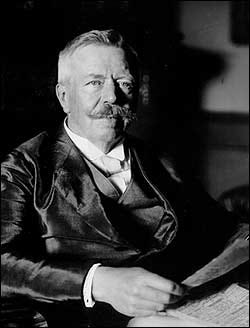
Jakob von Uexkull’s (1944–) grandfather, Baltic German biologist Jakob Johann von Uexkull (1864–1944), wrote in his book Staatsbiologie (1920) that the state can be viewed as an organism consisting of human cells. In order for the state to survive, all cells must cooperate.
3 That means that unhealthy cells and parasites have to be eradicated from the social body. This was a recipe for totalitarianism that was incorporated into the philosophy of the National Socialist Party.
The individual had to serve the common good, the Volk and the Reich, and be responsible for the well-being of future generations.
5 Those who were considered a burden on society had to be eliminated.
It can be argued that this philosophy has taken root in the United Nations. As American professor and futurist Oliver Reiser (1895–1974) wrote in his book The World Sensorium : The Social Embryology of World Federation (1946).
Fascism, as a glorification of the State, and Nazism, as a deification of the Volk, may “free” the individuals, i.e. they lose their individuality in a more “inclusive” unity, but the world is no better off for that! Only if the unity is sufficiently all-embracing to include the whole of humanity – more than “race”, “nation”, “religion”– can such wholeness-producing tendencies be encouraged.
Oliver Reiser used the analogy of an organism with human cells and argued that a world organism was emerging, with United Nations as its brain. Humanity had to be calibrated with the right values to be in tune with the planetary brain waves. That required total world planning and a global order with muscles. Reiser labeled it “Scientific Humanism” or “Planetary Socialism” and took inspiration from science fiction author H.G. Wells (1866-1946) and UNESCO founder Julian Huxley (1887-1975).
If society is not to collapse from unresolved conflicts and resulting failures at integration, the nations of the world must surrender some measure of their sovereignty and begin to function within the texture of a world-whole. This social nervous system, center of intellectual-social unification, is called the world brain.
After Reiser’s death in 1974, his ideas have spread to a larger audience by Hungarian systems philosopher and futurist Ervin Lászlò (1932-)and American New Age author José Argüelles (1939–2011). This was manifested in their futuristic project Noosphere Forum.
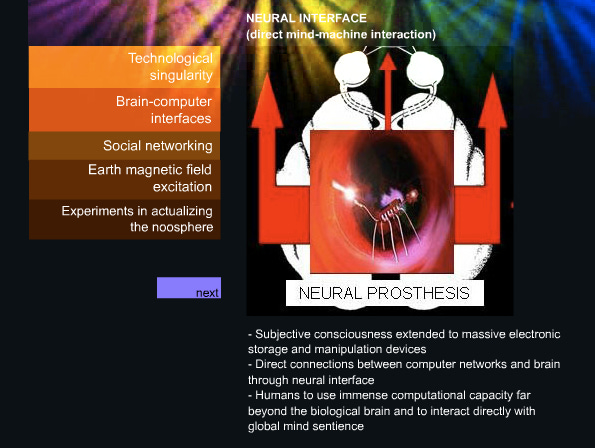
Screenshot from Noosphere Forum
Lászlò was also the editor of the Club of Rome-report Goals for Mankind in 1977 as well as The Objectives of the New International Economic Order in 1978, and founded Club of Budapest in 1993 “to be a catalyst for the transformation to a sustainable world through promoting the emergence of planetary consciousness and interconnecting generations and cultures”. Lászlò as well as Reiser were early members of World Future Society, an international community of futurists and future thinkers.
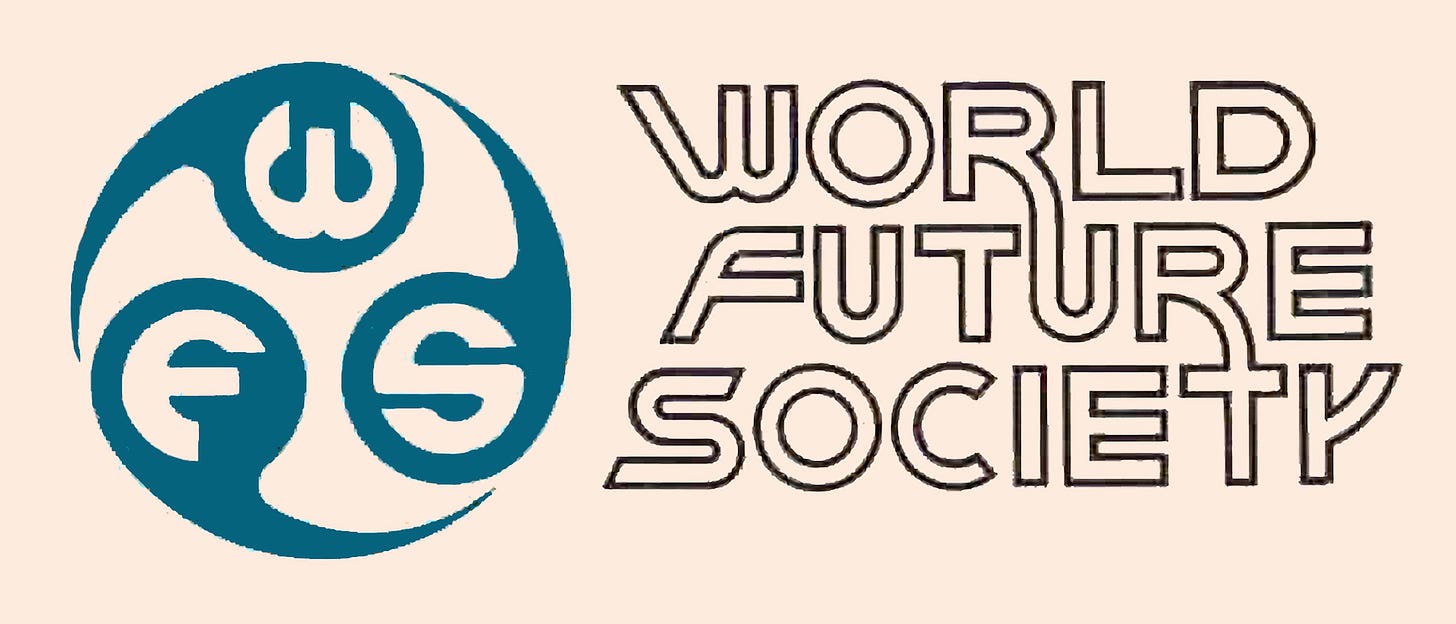
Reiser’s vision of realising H.G. Wells’ concept of a World Brain can, with the help of future technological advancements, evolve into a “Singleton”, a single decision making body for the world with omnipresent power, run by Artificial Intelligence.
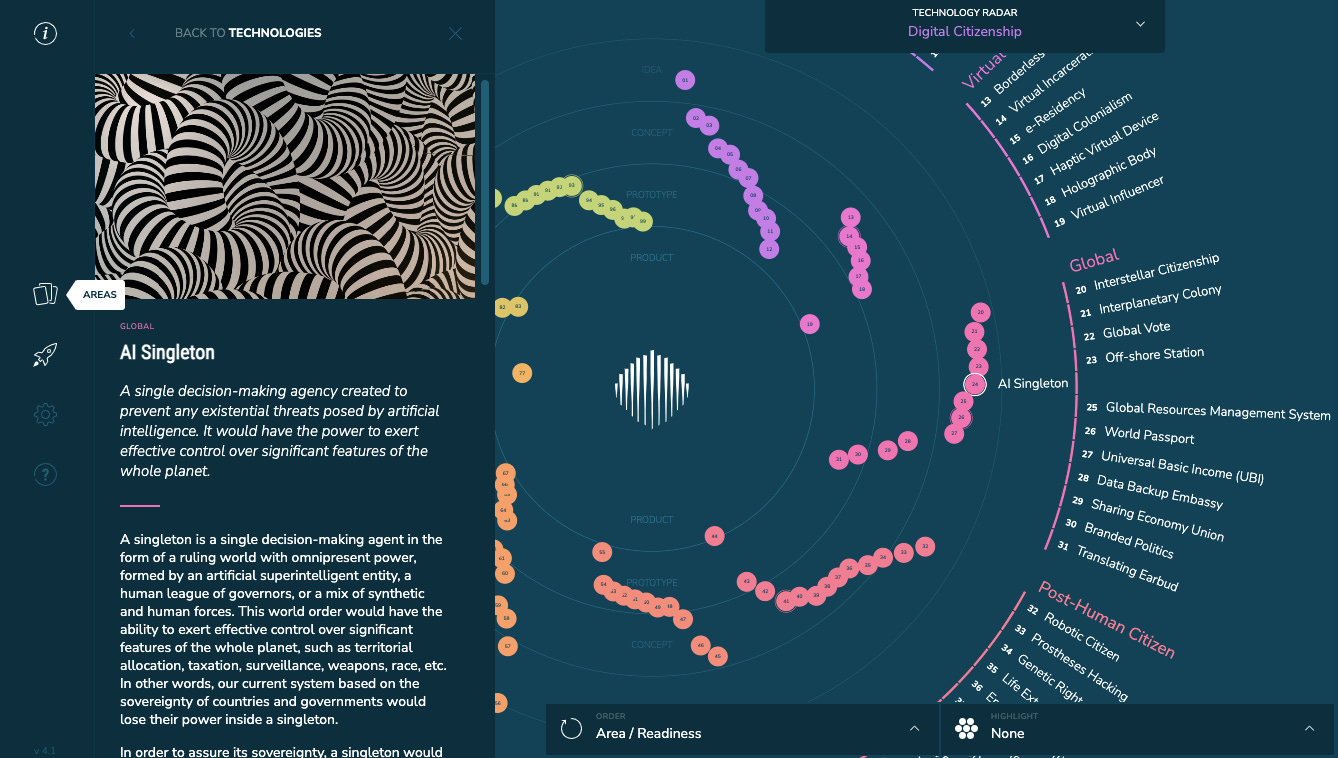
Screenshot the Technology Radar platform at the WEF and UN affiliated World Government Summit in Dubai.
The global catastrophic risks that are currently on the horizon could, according to an article on World Government Summit’s Technology Radar platform, “make the deployment of a Singleton essential”.
A pandemic, natural catastrophes on a global scale, environmental collapse, biological threats such a super bacteria, or even neural techniques that invalidate free will could all hasten the creation of a united Global force of governance.
This global force would be totalitarian. A sort of digital God. Swedish futurist philosopher Nick Bostrom (1973-) writes in his note What is a Singleton?:
Once formed, a future singleton might be perpetually stable. This could happen if surveillance, mind control, and other security technologies develop in such a way as to enable a singleton to effectively prevent the emergence of internal challenges.
The Millennium Project, a futuristic think tank that conducts futures studies and research with support from Dubai Future Foundation, has proposed that:
The Envoy should be a big media personality, recognizable to and respected by young people to strengthen the principle of intergenerational equity. There is a risk in having only one person; instead, consist of a team, including the UN SG when he retires, and/or a person from each continent, working together as a team, even including a trusted Artificial Intelligence.
As an AI in it self could pose an existential risk – that could wipe out humanity (!) – it has to be aligned with the “right values”. The AI could then ascend the throne as an envoy for future generations and help to accelerate the Sustainable Development Goals.
Forum for Future Generations
The last proposal in this UN policy brief is to create a “dedicated” Forum for Future Generations under auspices of the General Assembly.
This would not be a decision-making body but “a locus for debate and collaboration”. The Forum, which is to advance implementation of the declaration and share best practices, can be viewed as a compromise.
In Our Common Agenda, UN Secretary-General António Guterres proposed that a repurposed Trusteeship Council could be used as a “multi-stakeholder body to tackle emerging challenges and, especially, to serve as a deliberative forum to act on behalf of succeeding generations”. As such “it could issue advice and guidance with respect to long-term governance of the global commons, delivery of global public goods and managing global public risks”.
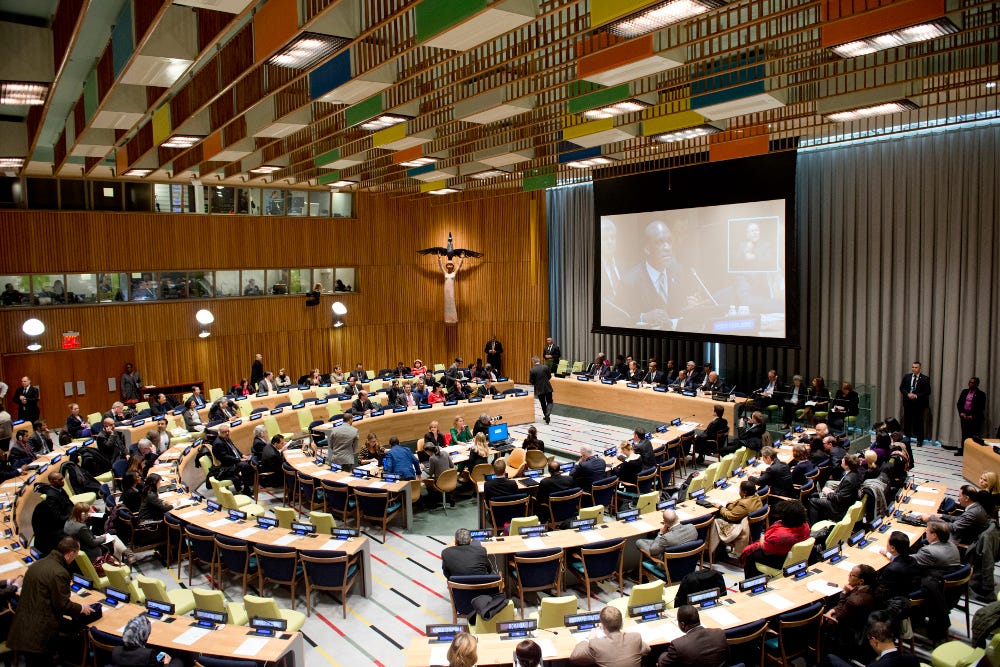
The idea was initially proposed in the Trilateral Commission report Beyond Interdependence: The Meshing of the World’s Economy and the Earth’s Ecology (1991), as well as in the Commission on Global Governance report Our Global Neighborhood (1995).
We propose that the Trusteeship Council … be given the mandate of exercising trusteeship over the global commons. The global commons include the atmosphere, outer space, the oceans beyond national jurisdiction, and the related environment and life-support systems that contribute to the support of human life.
The proposal fromGuterres did, however, not gain enough support from UN member states during the consultation process. But it is obvious that efforts will continue, from the trilaterals and their henchmen, to upgrade the Forum and move it into the Trusteeship Council’s chamber as soon as it is possible.
All they need is the right major crisis.
There are multiple actors that are working tirelessly to influence opinion and create an efficient forum for crisis management.
Global Challenges Foundation
The Stockholms-based Global Challenges Foundation, founded in 2012 by Swedish-Hungarian billionaire László Szombatfalvy (1927–2022), is “dedicated to promoting the creation and development of improved global decision-making models aimed at reducing and mitigating these risks.” They supported the High Level Advisory Panel on Effective Multilateralism (which advised on how to achieve the twelve commitments in Our Common Agenda) and is currently supporting the Executive Office of the Secretary-General (EOSG) at United Nations.
Johan Rockström (1965-), co-director of Potsdam Institute of Climate Impact and Research (PIK), and one of the originators of the Planetary Boundaries Framework, serves on the board of directors. He is a frequent WEF-attendee, and was invited to the Bilderberg meeting in 2019. In an interview for Sweden’s leading newspaper Dagens Nyheter, he said:
I can not see any other way than 200 nations having to surrender some of their decision-making sovereignty to a planetary institutional management. We have to work with institutions we have, and there is only one institution that is global, the UN.
Global Challenges Foundation issued their first Global Catastrophic Risk report, Global Challenges – Twelve risks that threaten human civilisation – The case for a new category of risks, in 2015, and has since cooperated with Nick Bostrom’s Future of Humanity Institute at Oxford University.
In the first report, they labeled an uncontrolled AI as an existential threat, but stated “that an intelligence of such power could easily combat most other risks in this report, making extremely intelligent AI into a tool of great potential”.
The report also discussed the topic of “bad global governance” and warned that a global totalitarian state could be on the rise to solve major global problems, but simultaneously implied that a civilisation collapse or billions of lost lives could be worse. These two competing outcomes were not easy to rank.
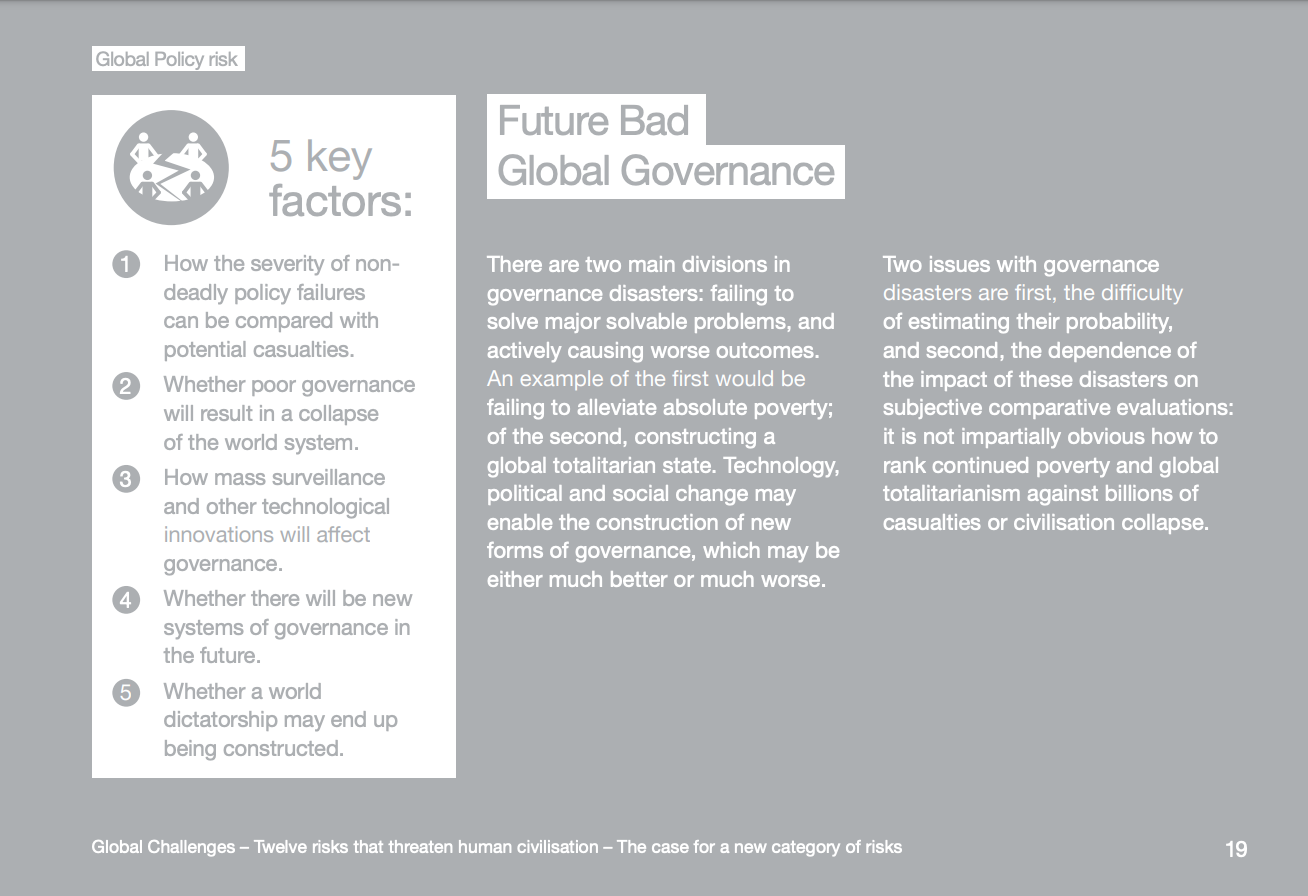
Global Challenges Foundation has since developed into one of the leading movers and shakers in the efforts to establish a new global security regime.
They have, for example, supported the idea of a Global Resilience Council which is to function as a security council for non-military global threats.
13 The proposal was included in the interim report from the GCF-supported Climate Governance Commission in 2021.
The Climate Governance Commission (with Johan Rockström as one of their commissioners) also presented a proposal, during the last UN General Assembly, to convene an intergovernmental Planetary Emergency Platform to deal with the planetary emergency that they want the General Assembly to declare at the Summit of the Future in 2024.
This planetary emergency could, to quote King Charles III, “put ourselves on what might be called a war-like footing” and give rise to the totalitarian world state that GCF warned about in 2015.
All for the “noble quest” of safeguarding the future for succeeding generations.
Declaration of a Planetary Emergency to begin “the long term reduction of global population”
·
Oct 10

Read more about the quest to construct a digital world brain in Rockefeller – Controlling the Game. The second edition will be released by Skyhorse Publishing, November 28th.
Preorder here
The book is also available in Polish and French. The Swedish edition is unfortunately sold out.
My other books can be purchased in our webshop.
www.un.org/sg/en/content/sg/statement/2019-05-28/secretary-generals-message-for-third-artificial-intelligence-for-good-summit
www.worldfuturecouncil.org/wp-content/uploads/2016/02/CIEL_WFC_High_Commissioner_for_Future_Generations.pdf
Mordini E. Biowarfare as a biopolitical icon. Poiesis Prax. 2005;3(4):242-255. doi: 10.1007/s10202-005-0005-0. Epub 2005 Aug 12. PMID: 32214963; PMCID: PMC7087952.
Stella, Marco & Kleisner, Karel. (2010). Uexküllian Umwelt as science and as ideology: The light and the dark side of a concept. Theory in biosciences = Theorie in den Biowissenschaften. 129. 39-51. 10.1007/s12064-010-0081-0.
The Journal of Modern History, Vol. 82, No. 1 (March 2010), pp. 61-100
Published by: The University of Chicago Press DOI: 10.1086/650507
Stable URL: www.jstor.org/stable/10.1086/650507
Reiser, Oliver (1946), The World Sensorium : The Social Embryology of World Federation, Kessinger Publishing, p 171
Ibid. p. 198
radar.envisioning.io/wgs-citizenship/?c=tech_T3TZ35wgo5gNFtZXi
nickbostrom.com/fut/singleton
millennium-project.org/wp-content/uploads/2022/08/UN-Foresight-Elements-report.pdf
globalchallenges.org/initiatives-funding/
www.dn.se/nyheter/sverige/johan-rockstrom-ar-miljororelsens-egen-piketty/
www.foggs.org/grc-global-resilience-council/
globalgovernanceforum.org/wp-content/uploads/2023/07/Interim-Report_-Governing-our-Climate-Future.pdf
Their new report on the future of global governance will be presented in the futurist world capital Dubai at the UN Climate Change Conference COP 28 (November 30-December 12, 2023).
Subscribe to The Pharos Chronicle – Jacob Nordangård, PhD
By Jacob Nordangård · Launched a year ago
Jacob Nordangård, PhD – Geopolitics, Science & Technology, Politics behind the scenes”
Leave a Reply